Contest conducted by Marc Smith
Competitors who have entered every competition this year can now begin discarding their weakest scores. We go into this month with less than 10 points separating the top five on the annual competition leader-board. There are also a couple of contenders who will be parachuting into contention having missed a month earlier in the year. They will now have the same nine counting scores as everyone else. There is all still to play for in the closing months of the year.
The Buffett Cup was held this month in Qingdao, China. This is a three-way tournament between teams of eight from Europe, USA and China. The regular teams tournament was followed by an Individual, a B-A-M in which players partner numerous other members of their team. Michal Klukowski was a member of the eight-player European team, and Jill Meyers represented USA. Europe won both events, with the USA twice finishing second.

Good luck to panel members competing in the upcoming European Champions Cup. I hope to report next month that some of you come away from Latvia with medals.
This month’s guest panelist needed a perfect 80/80 score to win the August competition. Hans Joele from Netherlands learned the basics of ‘Dutch Acol’ 43 years ago as a 10-year old, because his mother was tired of being invited to play only if the game needed ‘a fourth to make up the numbers’. “I picked the game up again as a student in Leiden, and began playing at local clubs,” says Hans. “I don’t play much these days, and certainly not at a serious level (sorry, Mom!). However, I enjoy watching the best play on VuGraph and reading Bridgewinners, so maybe I picked up one or two things over the years.”
A couple of this month’s deals have been sent to me by regular competitors. Hand 3 comes from Paul Dubois of California and Hand 6 from England’s Brian Ransley. Thanks to them. If you have a hand that you think would make an interesting problem for the panel to discuss, please send me details.
The panel produce a majority vote on four hands in this set, and a clear favourite on three others. Only Hand 8 really split the panel. Although the panel were often of similar mind on this month’s hands, the same cannot be said for competitors. Indeed, many readers can learn important lessons from the panel this month. For example, on each of the first two hands in this set, both of which are questions of evaluation, more than half of competition entrants underbid by some margin.
The most popular action chosen by the competition entrants scores ‘10’ on four of the eight hands, and voting with the largest group of competitors this month scores 63/80 (down from 68/80 in September). The average score this month is 48.46 (way down from 54.87 on Set 25-09). The low average score and the number of low scores on the panel suggests that this is one of the more difficult sets of the year. Let’s see what the panel have to say…
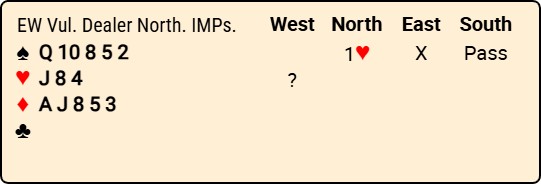
|
ACTION |
MARKS |
PANEL |
Competitors' |
|
4♠ |
10 |
12 |
18 |
|
2♥ |
8 |
4 |
15 |
|
3♠ |
5 |
2 |
10 |
|
2♠ |
4 |
4 |
31 |
|
1♠ |
0 |
0 |
21 |
|
2♦ |
0 |
0 |
2 |
|
Pass |
0 |
0 |
1 |
|
4♣ |
0 |
0 |
1 |
|
4♥ |
0 |
0 |
1 |
Competition Entrant Average Score: 4.74
Responding to takeout doubles is a topic on which teachers would serve their students well by devoting more time. Players too often seem to just make a minimum bid in their longest suit, with no consideration of hand strength. Look at over 20% of competitors bidding 1♠ on this hand! Indeed, more than half of competition entrants chose either 1♠ or 2♠.
The way to think about this auction is to imagine that partner has opened the bidding in your longest suit (playing 4-card majors). Effectively that’s what partner has done: his double of 1♥ here shows an opening bid and strongly suggests four spades. Facing that, would you even consider passing (the equivalent to responding 1♠), or even raising to 2♠? Surely, most players would at least invite, and many would just bid game. In terms of hand evaluation, this situation is not so different.
Let’s start with the handful of panelists who did not think this hand worth game…
WENFEI WANG: 2♠. Just an invite.
SIMON DE WIJS: 2♠. This is an underbid, I know. I hope to survive this round of bidding, in order to be well placed should partner have some strong hand.
HANS JOELE: 2♠. I am being cautious because it seems quite likely that partner has a strong club single suiter or a balanced hand too strong for 1NT. Partner's next call (and opponents' actions) will inform my next decision. (I doubt it will go all pass).
Really? Why not?
LIZ McGOWAN: 2♠. The alternatives are pretty gruesome.
‘Gruesome’ is perhaps how some panelists (or partner) might describe this choice 😊
Alan and Barnet were a little more adventurous…
BARNET SHENKIN: 3♠.
ALAN MOULD: 3♠. This seems about right on values, but maybe I should force to game...
The rest all commit to at least game via one route or another.
PIERRE SCHMIDT & JOANNA ZOCHOWSKA: 4♠. We cannot even see a second choice. Where's the trap?
ZIA MAHMOOD: 4♠. Like sex and old age, the quicker the better.
PAUL MARSTON: 4♠. Simply bidding what I think I can make.
SALLY BROCK: 4♠. Who knows whether the hands will fit or not? I can’t think of a way for partner to help, so I’ll just bash.
A couple toyed with 3♠ but rejected that idea…
ANDREW ROBSON: 4♠. I think I’m too good for 3♠, although that may work better if partner has a modern impure double, with three bad spades (and hearts). Do I worry about partner having a big club hand? A bit, but I like a style where you bid a heavy 2♣ with those.
DAVID BIRD: 4♠. A response of just 3♠ typically shows the values for a jump to 2♠ with a fifth spade. This particular hand, facing expected shortage in hearts, is full value for 4♠. There are only seven losers, before you adjust for the likely heart situation.
For some, the only worry is that 4♠ may not be enough…
MARTY BERGEN: 4♠. I certainly can't do less. Opposite a perfect hand, we could have a slam in spades or diamonds but, other than freak hands, trying for slam after an opponent opens is impractical.
LARRY COHEN: 4♠. I am a little afraid partner might have a big double with clubs, but I can't only invite in spades - as little as Kxxx/xx/Kxxx/xxx (an absurd double, of course), gives me play for game. How would partner ever know to accept an invite? Opposite a minimum such as: AKxx/x/Qxxx/Qxxx, I have play for 6♠.
P.-O. SUNDELIN: 4♠. I hope partner does not have a strong club hand.
CHRISTIAN MARI: 4♠. 2♥ is dangerous.
MIGUEL VILLAS-BOAS: 4♠. I don't like to give opponents time on this type of hand. They might find their fit in clubs.
ROB BRADY: 4♠. A vulnerable game? Count me in! I'm of the belief that, with five cards in a major opposite partner's takeout double, you bid your suit, and so a 2♥ cuebid denies spades. We don't need five ways to show a spade suit in this auction!
I don’t see how ‘2♥ denies spades’ is playable. Add an ace to this hand, or an ace and a king, and what can you possibly bid other than 2♥? Some hands will simply be too good to bid 4♠. Short of just guessing to bid 6♠ (when 7♠/6♦/7♦ could easily be better), good hands have to start with a cue-bid irrespective of shape. Some thought this hand was good enough for that approach…
JILL MEYERS: 2♥. I see no reason to jump directly to 4♠. Let's see what partner has to say.

MATS NISLAND: 2♥. This hand is too good for 2♠ and, for me, 3♠ shows a weaker hand with longer spades. As long as partner does not have a strong hand with clubs, we will play 4♠ (or higher).
HANOI RONDON: 2♥. I have a strong hand and spades seems to be the suit, but I do not want to rule out the possibility of reaching a slam in diamonds.
JOEY SILVER: 2♥. With slam a real possibility, a cue-bid is the only way to show the true value and power of this seven-loser hand in the context of the auction.
On this deal from an early round of the Spingold, one West bid 2♠, ending the auction. At another table, Kalita bid 4♠. Partner had a minimum double, only Kxxx/Kx/K10x/Kxxx. With opener holding most of the missing high cards, as expected, 4♠ was still an easy make. Would partner raise even a jump to 3♠ to game? I suspect not. The 2♠ bidders certainly end up with +170 and 10 IMPs out.
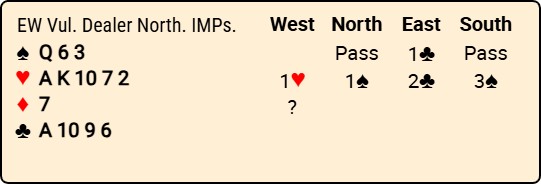
|
ACTION |
MARKS |
PANEL |
Competitors' |
|
4♠ |
10 |
11 |
12 |
|
4NT |
8 |
7 |
8 |
|
Dbl |
7 |
1 |
7 |
|
6♣ |
6 |
2 |
5 |
|
5♣ |
4 |
1 |
43 |
|
4♣ |
0 |
0 |
16 |
|
4♦ |
0 |
0 |
4 |
|
3NT |
0 |
0 |
3 |
|
4♥ |
0 |
0 |
2 |
|
Pass |
0 |
0 |
1 |
Competition Entrant Average Score: 4.35
There is mo majority vote from the panel, which is split between two principal choices. For the second consecutive deal, a huge number of competition entrants significantly undervalue their hand. On this one, you have to picture the sort of hand you expect opposite. Partner has opened the bidding and freely rebid his suit. The opponents’ bidding strongly suggests they will hold at least nine spades, and partner did not make a support double to show three hearts. As little as x/xx/Axxx/Kxxxxx gives you play for slam (and he will clearly have more than that, so add the ♥Q, ♣Q, ♦K, for example, or even the ♠A). With the two largest group of competitors bidding only 5♣ (46%) or, god forbid, a non-forcing 4♣ (13%), it is easy to see why this is the month’s lowest-scoring hand. We start with panelists who did bid some number of clubs…
LIZ McGOWAN: 5♣. We might miss slam, but at least this is unambiguous.
Hmmm. So is this, although a little more ambitious…
P.-O. SUNDELIN: 6♣. Lacking methods to explore five, six or seven.
MARTY BERGEN: 6♣. Assuming that N/S have nine spades, once partner shows 6+ clubs and fewer than three hearts, all we need for slam is the ♣K and ♦A. Indeed, opposite a spade void, 7♣ might be great if he has an 0-2-4-7 hand with 7 HCP! Even if 4NT is RKC for clubs, a response of one key-card would be fatal. So, I will settle for the blast to six, which might even produce a phantom save when partner has the wrong hand.
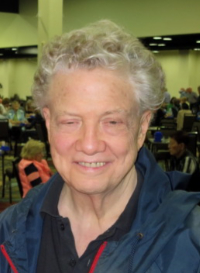
The rest all choose to investigate…
WENFEI WANG: 4♠. A slam try in clubs.
MIGUEL VILLAS-BOAS: 4♠. Showing strong club support.
JILL MEYERS: 4♠. I have too much to just bid 5♣.
HANOI RONDON: 4♠.: A cuebid agreeing clubs. Slam is a very clear possibility.
ANDREW ROBSON: 4♠. Showing a good raise to 5♣. I pay off to those hands where partner has something like Jx/xx/KQx/KQJxxx.
BARNET SHENKIN: 4♠.
Hans summarizes the case for the 4♠ bidders…
HANS JOELE: 4♠. I don't think that this should promise a spade control. We have no other way to show a slam-invitational club raise: 4♣ would be non-forcing and 4♦ is natural. Partner is almost certainly short in spades, so slam is likely and even a grand by no means out of the question (eg. A/Qx/Axxx/Kxxxxx). Partner will appreciate the value of his key cards and his spade void. Hopefully, he can Blackwood.
SIMON DE WIJS: 4♠. A forcing 4♣ would be nice, but I don’t think it is so I will make do with this effort instead. Sure, sometimes opponents will only have eight spades between them, and they will be able to cash the first two, but you cannot live in fear of these unlikely things.
Christian suggests an alternative interpretation of the bid…
CHRISTIAN MARI: 4♠. I bet on a singleton spade in partner’s hand. This bid should be understood by East as RKCB.
A couple pose the question to which regular partnerships need to know the answer – what is 4NT?
MATS NISLAND: 4♠. This is too good for 5♣. I hope we can trust the opponents having nine spades. If available, 4NT as a good raise to 5♣ would be an alternative.
JOEY SILVER: 4♠. With no suit agreed, I doubt 4NT would be key-card for clubs, so my only reasonable choice is to show my support for clubs via the clunky 4♠ cue-bid. Hopefully, partner can take control.
So, what is 4NT? For this faction, the answer is clear…
ZIA MAHMOOD: 4NT. Is this a problem? We need to know the responses, but it’s hard to believe we do not have a slam if we play support doubles.
LARRY COHEN: 4NT. This is why 14-30 became popular. Opposite one key card, I can pass and, if he has two, I want to be in 6♣. (Let's hope the opponents have nine spades 😊).
PAUL MARSTON: 4NT. Given partner is short in spades, I want to play in six if he has two key cards.
ALAN MOULD: 4NT. RKCB, provided I play 41/30, not 30/41....
David makes a good case and, for me, wins the debate in favour of his choice…
DAVID BIRD: 4NT. Assuming that he has a singleton spade, Blackwood will tell me most of what I need to know. Opposite something like x/Qx/Axxx/KJxxxx, slam is excellent, but it seems unlikely that 4♠ will sufficiently encourage him, and I’ll have to guess when he retreats to 5♣.
ROB BRADY: 4NT. At these colors, I'm suspicious of North's promised spade length, but I'll make the practical choice and gamble on partner's shortness to bid Keycard. Fortunately, we play 1430! 4♠ is a cute alternative, but the singleton diamond and heart king compels me to take control.
SALLY BROCK: 4NT. I will assume he has a singleton spade. I just need a couple of key cards, and perhaps a little help in hearts.
There was only one maverick adopting an alternative route to slam…
PIERRE SCHMIDT & JOANNA ZOCHOWSKA: Dbl. If we trust the opponents to have a nine-card fit, and our partner not to have three hearts (he would double nearly automatically), then we are not far from slam. However, we don't have available a natural and forcing club bid. Double solves our problem now, but we are glad you did not ask the question about our next bid when the tray comes back.
When the deal arose in the Spingold semi-final, West jumped to 6♣. This was not a success facing x/x/KJ10xx/KQJxxx. The 4NT bidders certainly manage to stop in time. Will all of the 4♠ bidders pass when partner retreats to 5♣? Probably, but maybe some may picture David’s hand above and award themselves a sixth club anyway. Those who jumped to 5♣ should consider themselves fortunate to escape with a flat board on this occasion.
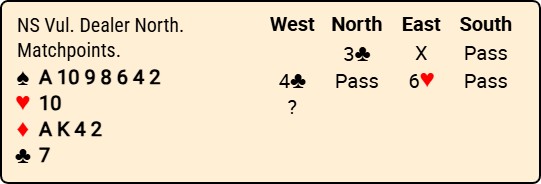
|
ACTION |
MARKS |
PANEL |
Competitors' |
|
6♠ |
10 |
11 |
49 |
|
7♣ |
9 |
4 |
2 |
|
7♠ |
7 |
1 |
3 |
|
Pass |
6 |
4 |
42 |
|
7NT |
6 |
0 |
1 |
|
7♥ |
5 |
2 |
4 |
|
6NT |
3 |
0 |
1 |
Competition Entrant Average Score: 8.30
No majority from the panel, but a clear favourite nonetheless, and nearly half of competition entrants concur with that choice. Only one member of the panel recognized that this was the companion hand to one we saw a few months ago. More of that at the end…
MATS NISLAND: 6♠. I guess I planned to rebid these spades.
PAUL MARSTON: 6♠. Proceeding gingerly. I can't wait to see dummy: nothing will surprise me.
DAVID BIRD: 6♠. It's too dangerous to pot either major-suit grand. Nor is there is any reason to expect solid hearts opposite. After all, partner would have expected me to have some hearts for my 4♣ cue-bid.
JOEY SILVER: 6♠. With a powerful single-suited heart hand, I think partner would jump in hearts rather than make a takeout double. I therefore expect my ox to have something in spades. Seven may well be cold but, with no way to tell, I will content myself with either a disaster or a small slam bonus.
MIGUEL VILLAS-BOAS: 6♠.
A number of panel members hoped that partner would raise with the right hand…
LIZ McGOWAN: 6♠. Partner expects hearts that I do not have. If the double was based on a strong hand with hearts, he surely also has some big spades? I guess I am showing spades and diamonds so, if the grand is making, partner will bid it...
HANOI RONDON: 6♠. It's my suit, I’ll trust partner to bid seven if he has what's needed.
BARNET SHENKIN: 6♠.
ZIA MAHMOOD: 6♠. I’m not really allowed to, but he can bid 7♥ if he wants. I would be upset if my partner did this, but I have a grand slam try and don’t have the balls to bid 7-any.
That doesn’t sound like the Zia of 20 years ago… older, or just wiser?

HANS JOELE: 6♠. Partner is probably bidding under the assumption that I have both majors. I think he should have a 'flexible' hand with (very) significant extra values, rather than a strong single-suited hand, on which he could have bid 4♥ over 3♣. I suspect we'll make seven, but I'll chicken out with 6♠ because I'd be heartbroken if they cash the ♣A or there is a trump loser. I might have just blasted 6♠ on the first round, which is about what the hand is worth facing a three-level takeout double. However, this route may enable partner to raise to a cold grand.
SALLY BROCK: 6♠. I don’t think he can have a hand without some spade tolerance. In fact, it’s hard to think of a hand he can have at all! If he just had hearts, he would have bid some number of them in the first place (at least when he’s missing my A, A-K). So, I think he’s 3-6. Maybe I should bid seven, but I’m a wimp!
Only one panelist was prepared to commit on the information already available…
P.-O. SUNDELIN: 7♠. I am hoping for KQx/AKJ9xx/x/AJx rather than Qx/AKQJ9xx/x/AKx, although both are possible.
While a couple were willing to bid a grand in partner’s suit…
ALAN MOULD: 7♥. Really?? I cannot see how 7♥ isn't cold when I have A-K-A. Maybe I should bid 7NT but, just occasionally, a ruff is needed or the opposition have kept quiet with their club fit and partner is void....
MARTY BERGEN: 7♥. Wow! Partner has forced to slam, when I could have had a very modest hand. Obviously, I am only guessing. We might have no play for this, or belong in spades.
P.-O. highlights the problem above, and a handful made what is surely the right bid if you are going to commit to the seven-level…
SIMON DE WIJS: 7♣. Partner could also have bid 5♥, so I am bidding on with this monster to try to find the best grand slam.
ANDREW ROBSON: 7♣. Pick a grand. What else can it mean? I like to play that the double of a pre-empt is never a single-suiter, but partner may not be on the same page there.
LARRY COHEN: 7♣. I want to bid a grand, but I am afraid to bid 7♠ and catch something like K/AKQJxxx/xx/Axx. Maybe partner should have started with 5♣ with a club control, but he might have been afraid of me leaping past hearts. On the other hand, partner has MORE than a 4♥ overcall, so it is hard to imagine anything less than solid hearts and the ♣A.
ROB BRADY: 7♣. I really want to abstain - why did we bid 4♣? I see that this is the companion to Hand 8 from June's set this year. I don't understand the 6♥ bid since 5♥ would show a power double with hearts. (You can blame the panel for that. MS) Partner is playing us for length in both majors which we don't have. I'll pull 7♦ to 7♥ and, hopefully, partner will get the picture that I'm unsure what they are showing and offering spades as an alternative strain.
Over 7♣, partner might even choose the optimum matchpoint contract, 7NT.
The final group give their partner no chance of finding a winning choice.
CHRISTIAN MARI: Pass. Good luck!
JILL MEYERS: Pass. Partner obviously has a one-suiter in hearts. (He could have made another bid to give me choices). Perhaps I should raise, but I am just going to Pass.
Unlucky, as the 4-2 trump break means that even the six-level is one too high with hearts as trumps.
WENFEI WANG: Pass.
PIERRE SCHMIDT & JOANNA ZOCHOWSKA: Pass. A tough one. Sometimes I hate you, partner! But, okay, you hold a too strong and unbalanced hand for another bid, and you try to send some message. Can I get it? Does partner will have something like --/AKJ10xxxx/QJx/AQ or KQx/AQJ10xxx/x/AQ? With the latter, he might have bid 5♣ on the previous rounds, so let's go for the former. We respect very much those who will bid 6♠ (after all, partner can convert to 6NT) or even go for a grand slam. (7♣ would be a big hit when partner's hand is --/AKQxxxx/QJxxx/A).
As Rob pointed out, this is the companion to Hand 8 in the June competition, when the panel voted to bid 6♥ on KQJ/AK96xx/xx/AK. Yes, other options were suggested (5♣ and 5♥ gaining most support), but the largest group of panelists voted for a jump to 6♥. (Is bidding over 5♣ any easier on this hand?)
As you can see, both 7♠ and 7NT are easy makes, so 7NT is the top spot at MPs, although getting to either making grand would have scored well. With the defenders’ hearts breaking 4-2, even the six-level was too high in that suit, and reaching even 6♠ or 6NT scored well above average when the hand occurred.
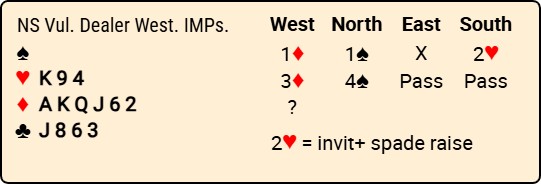
|
ACTION |
MARKS |
PANEL |
Competitors' |
|
4NT |
10 |
13 |
11 |
|
5♦ |
7 |
5 |
39 |
|
5♣ |
7 |
2 |
24 |
|
Pass |
4 |
2 |
13 |
|
5♥ |
2 |
0 |
2 |
|
Dbl |
0 |
0 |
9 |
|
6♦ |
0 |
0 |
1 |
Competition Entrant Average Score: 6.11
The first decision is whether to defend or to bid on, and the panel voted 20-2 in favour of bidding. The next question is whether to simply rebid our strong suit, or to offer partner a choice. And, if offering a choice, do we make him choose between the minors or between the red suits? Let’s start with those who decided they had already heard enough…
ALAN MOULD: Pass. I don't see any reason to bid again.
WENFEI WANG: Pass. I don’t think we can make 5♦.
But can you beat 4♠?
PAUL MARSTON: 5♣. I should not be making this decision, but I erred on the previous round. I should have bid 3♣ or 4♣, then waited for partner's decision.
I’m not so sure about that approach with such suit disparity.
JOEY SILVER: 5♣. Not wishing to sell, I would like to bid 4NT, and hear partner bid a suit. However, I fear he might think it is Blackwood, so I will keep things simple, and I'll bid my good club suit myself. He will know that I am 6-4 (or 7-4) as I did not bid 3♣ on the previous round.
Although only Paul and Joey chose 5♣, does that not seem like a better option than 5♦ just in case partner’s shape is something like 3-5-0-5?
MATS NISLAND: 5♦. No crystal ball here, but I doubt clubs will play better.
Do you have to guess?
SALLY BROCK: 5♦. Ok, you got me!!
SIMON DE WIJS: 5♦. Ok, you tricked me into this. There is always room to blame partner for not doubling 4♠.
P-O provides us with a full deal.
P.-O. SUNDELIN: 5♦. This might make if the ♣Q is onside, partner holding something like xxx/QJxxx/xx/K10x. And, perhaps 4♠ also makes, with North holding AJ10xxx/Ax/x/Qxxx and South KQxx/xxx/xxxx/Ax.
ZIA MAHMOOD: 5♦. No idea, but I’ve had a drink so I can’t pass.
The majority wanted to give partner a choice, but some don’t reveal which two suits they plan to offer…
CHRISTIAN MARI: 4NT. Who knows?
BARNET SHENKIN: 4NT.
ANDREW ROBSON: 4NT. I surely can’t sell with this shape and playing strength. 4NT implies this shape, and I’m betting we’re very cheap (even making).
MIGUEL VILLAS-BOAS: 4NT. This is a dangerous hand. It’s quite possible that they can make 4♠ and that we can make game at the five-level.
LIZ McGOWAN: 4NT. Partner did not double 4♠, so it is probably making. I hope she has either five hearts or clubs...
Is he expected to bid 5♦ with 3-6-1-3, or is he allowed to bid hearts over 4NT as you didn’t bid 5♣?
ROB BRADY: 4NT. We forgot to make a support double; oh well. I hope partner is fitting one of our minors.
HANOI RONDON: 4NT: I'll decide whether to pass 5♣ later. At least I'm giving him a choice :)
MARTY BERGEN: 4NT. With my solid suit and void, I would have bid 4♦ on the previous round. With all that, and the favourable vulnerability, I am definitely not passing now. I considered 5♦ but, opposite distributions such as 3-4-1-5, I'd much prefer to play in clubs.
Of course, that distribution is possible, but David has a different plan…
DAVID BIRD: 4NT. With so much bidding around the table, partner will often have more than four hearts but a hand not strong enough to bid 2♥ over North’s 1♠. This 4NT shows two places to play and, if partner offers 5♣, I will move to 5♦. This shows 3-6 or 3-7 in the red suits as, with four hearts, I would have supported that suit on the previous round.

HANS JOELE: 4NT. With a void, I don't think it's right to defend if partner can't double 4♠. The question is whether to insist on playing in your solid suit, or to involve partner in the decision. As partner can have a five-card club suit or six hearts, I think the latter is better.
LARRY COHEN: 4NT. As Marty Bergen says, "The Magic of Voids." I am not defending. We could even have a slam opposite as little as Jxx/Qxxx/x/AQ10xx!
PIERRE SCHMIDT & JOANNA ZOCHOWSKA: 4NT. Definitely undisciplined, but tempting. There is a big difference between our actual hand and xx/Qx/AQJ10xx/KJx, that we could have. One remark, though: if you play "good/bad 2NT" in this situation (as we do), then 3♦ would have already shown a good hand (2NT a bad one), and then a final Pass would be more adequate, as you already "sold" your hand.
On this deal from the semi-final of the Spingold, West doubled at the table and East passed with Qxx/Axxxxx/xxx/x. 4♠-doubled went one down but, with hearts 2-2, 12 tricks were easy in either red suit. Everyone except the passers got their side to a making game.
Should East bid over the double or, perhaps, even bid 5♦ directly over North’s 4♠? Perhaps I’ll save that one for the panel sometime next year 😊
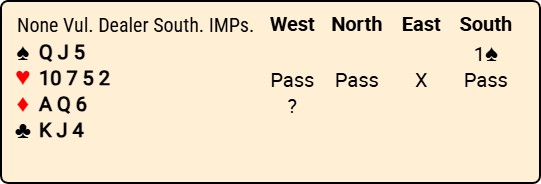
|
ACTION |
MARKS |
PANEL |
Competitors' |
|
2NT |
10 |
16 |
30 |
|
2♠ |
7 |
5 |
18 |
|
2♥ |
5 |
1 |
10 |
|
1NT |
5 |
0 |
15 |
|
3NT |
3 |
0 |
13 |
|
3♥ |
2 |
0 |
8 |
|
4♥ |
0 |
0 |
4 |
|
Pass |
0 |
0 |
1 |
|
2♣ |
0 |
0 |
1 |
Competition Entrant Average Score: 6.06
The question setter can usually be relied upon to give us a breather at some stage. Three quarters of the panel and nearly a third of competitors considered this the ‘easy 10’ for the month. The panel offered a smattering of support for a second option, although competition entrants came up with a number of alternative suggestions. Alan seems to be zigging when the panel are zagging this month, and he is on his own again here…
ALAN MOULD: 2♥. I don't have a strong preference between 1NT and 2♥. Definitely nothing higher.
At the other extreme, a handful were willing to effectively force to game opposite what could be a 1-4-4-4 9-count.
ROB BRADY: 2♠. A slight overbid, but nothing feels good here. Let's force to game and hope one makes. At the table, I may have doubled 1♠ earlier to sidestep this problem.
SALLY BROCK: 2♠. I would have doubled 1♠ (partly to avoid this type of problem).
JILL MEYERS: 2♠. Let's see what partner has to say.
It may not be ‘Thank You’ when this appears in dummy 😊
PAUL MARSTON: 2♠. I plan to raise 2NT and to bid 3♥ over 3m.
P.-O. SUNDELIN: 2♠. In the vain hope of making partner declarer.
The rest were in agreement on the question of what this hand is worth…
CHRISTIAN MARI: 2NT. Not perfect, but what is better?
MARTY BERGEN: 2NT. I'm not sure this is right, but it feels like the best I can do.
WENFEI WANG: 2NT. Natural and invitational.
SIMON DE WIJS: 2NT. A natural invite. This feels about right with this shape.
MATS NISLAND: 2NT. This is a little too good for either 1NT or 2♥.
ZIA MAHMOOD: 2NT. A 2♠ cue-bid might work out, but this seems to be the most descriptive choice.
BARNET SHENKIN: 2NT.
DAVID BIRD: 2NT. I will knock off 2 HCP as partner is in the protective seat. 3NT may be the best game, even if partner holds four hearts.
MIGUEL VILLAS-BOAS: 2NT. 4333 shape with QJx in spades, 2NT is ok.
LARRY COHEN: 2NT. A hodgepodge description, trying to get across as much as I can.
LIZ McGOWAN: 2NT. I have no reason to think hearts will play better than NT.
You were spot on there, Liz.
ANDREW ROBSON: 2NT. This is about right on values. We can still get to 4♥ if that’s right, but the spade holding is pretty no-trumpy.
HANOI RONDON: 2NT: I can later tell partner I had a heart in with my diamonds if the major turns out to be a better denomination.
JOEY SILVER: 2NT. I am not happy about it, but 2NT does show the high card value of my hand. Holding a 4333 with four weak hearts, I'll gamble that we belong in NT despite holding only one spade stopper.
A number of panelists mentioned the possibility of doubling on the first round. Although I am half Italian, I confess that is not my style.
HANS JOELE: 2NT. This is not a hand of great beauty, so it may disgust some people that I would have considered a takeout double in second seat. At IMPs, I feel I should now invite game, and 3♥ really doesn't appeal.

Our French Mixed champions accurately sum up the problem…
PIERRE SCHMIDT & JOANNA ZOCHOWSKA: 2NT. 13+-14 balanced. It's the definition of the bid. No reason at this stage to believe that, even when partner has four hearts, a heart contract will be better than NT. Note: many would double 1♠ nowadays.
At the table, partner had A10/9xxx/10x/AQxxx, so 3NT essentially needed the diamond finesse through the opening bidder. 4♥ is significantly worse and, at the table, North had the singleton ♥J so there were four trump losers. Whether partner will raise 2NT is questionable, but at least you will go plus. Can the 2♠ bidders avoid playing game in the doomed 4-4 major-suit fit. Unlikely, I suspect.
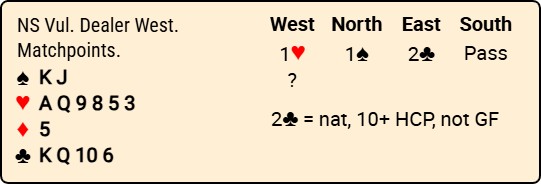
|
ACTION |
MARKS |
PANEL |
Competitors' |
|
2♠ |
10 |
13 |
26 |
|
3♦ |
7 |
4 |
3 |
|
4♦ |
6 |
1 |
4 |
|
3♥ |
6 |
1 |
23 |
|
4♣ |
5 |
2 |
6 |
|
4♥ |
5 |
0 |
6 |
|
5♣ |
4 |
0 |
3 |
|
3♣ |
3 |
1 |
14 |
|
2♥ |
3 |
0 |
10 |
|
3NT |
0 |
0 |
2 |
|
2♦ |
0 |
0 |
1 |
|
2NT |
0 |
0 |
1 |
Competition Entrant Average Score: 5.85
Another decisive vote from the panel, and more than a quarter of competition entrants pick up top marks. However, almost a quarter of competitors score poorly by choosing a non-forcing bid, either 2♥ or 3♣, whilst the panel almost all force to game or open slam investigations. On the panel, only Mats was willing to stop in a partscore…
MATS NISLAND: 3♣. A difficult hand, but I don’t want to deny support. I am not sure if 3♦ would be a splinter in competition, so I prefer an underbid to a misunderstanding.
Mats raises a question we’ll get back to later.
The majority elected to start with a random forcing bid…
MARTY BERGEN: 2♠. Neither 2♥ nor 3♣ is forcing here, so I will force with a cue-bid, and hope we can make a game.
CHRISTIAN MARI: 2♠. Not ideal, but I want to retain the chance to show six hearts and, later, perhaps the club fit. 3♣ now would not be forcing for me.
PAUL MARSTON: 2♠. Just getting the discussion started.
LARRY COHEN: 2♠. Just getting started. More decisions in my future.
SIMON DE WIJS: 2♠. We might lose three tricks in a club contract, so I am trying to give our partnership a chance to find 4♥.
HANS JOELE: 2♠. This might initially send the wrong message (extras without a stopper?), but I want to keep 4♥ (or more) in the picture, so I'll start with a generic forcing bid. I am also not thrilled about my spade holding, particularly if we end up in clubs, so this seems the best way to find the right denomination and level.
ROB BRADY: 2♠. I'd prefer to play 2♣ promises a rebid so I can bid 2♥ here but, undiscussed, I won't take the chance partner passes. There will be plenty of time to show our suits still, and this might inspire partner to search for a slam later with the perfect hand, say Qxx/x/Axx/Axxxxx.
PIERRE SCHMIDT & JOANNA ZOCHOWSKA: 2♠. Let's keep all our options open and learn more from our partner. Of course, we would also bid 2♠ with a "garbage hand", such as xxx/AQxxx/KJx/Qx, but we will clarify later as that is not the case here.
Joey makes a good case for the majority choice…
JOEY SILVER: 2♠. It will be difficult to reach NT if I splinter, not to mention making my spade holding vulnerable. So, I will gently probe with the ubiquitous cue-bid, keeping game in either NT or hearts in the picture. After all, we are playing pairs where, for the most part, minor-suit games are frowned upon.

Zia raises a key question if you do want to support clubs right away…
ZIA MAHMOOD: 2♠. Would 3♦ by me be a splinter? As we have no specific agreements, I’ll take the safe route and start with a strength-showing cue-bid.
Regular partnerships should compare the opposing views of Jill and Andrew, and make sure that they are on the same wavelength…
JILL MEYERS: 2♠. I will force to game as I want to hear what partner has to say. I would not play 3♦ is a splinter here (as I do not think 2♦ is forcing).
ANDREW ROBSON: 2♠. 2♦ should be forcing, therefore 3♦ a splinter, but I’m not chancing it. Let’s set up a game force and take things from there. We don’t want to miss a mundane 6-2 fit 4♥.
DAVID BIRD: 2♠. I might win the post-mortem if I bid 3♦, claiming that it must be a splinter (even opposite a non-game forcing 2♣), but I will not take the risk.
Despite doubts expressed by some panelists, the majority views seems to be that…
ALAN MOULD: 3♦. Splinter, of course.
SALLY BROCK: 3♦. Shortage. Partner can bid 3♥ or 3♠ easily enough to still allow 4♥/3NT.
LIZ McGOWAN: 3♦. Splinter, showing a better hand than a raise. If partner does not have real clubs we can still play in hearts.
BARNET SHENKIN: 3♦.
Or, to really make sure that partner gets the message.
WENFEI WANG: 4♦. Splinter.
That is surely more informative than simply agreeing clubs at the four-level…
MIGUEL VILLAS-BOAS: 4♣. If partner has two aces, I would like to play 6♣.
P.-O. SUNDELIN: 4♣. I am hoping for xxx/x/Axx/AJxxxx rather than xx/Jx/KQxx/AJxxx.
Only Hanoi votes for my choice when I was first presented with the problem…
HANOI RONDON: 3♥. I have great values, but I'm worried about a spade through my hand if we play in clubs. I'd rather play in hearts or NT. It is matchpoints, after all!
Partner had Qxx/xx/AJx/Axxxx, so a spade lead coming through your K-J was not the disaster it might have been. With the ♥K onside, you can make 6♣, but it seems clear that 4♥ is the best contract at MPs. Our correspondent tells me that +450 was worth a remarkable 90%, with most of the field in 5♣. Even playing 4♣+2 was worth 30% of the MPs, although anyone who thinks a jump to 4♣ here is non-forcing surely doesn’t understand the game.
Regular partnerships should make sure that they are in agreement on whether 2♦ and/or 2♥ are forcing, as well as the meanings of 3♦ and 4♦.
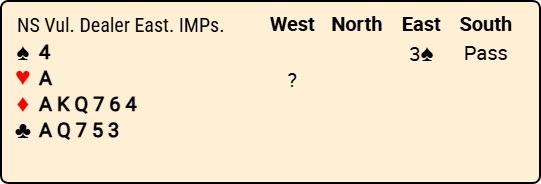
|
ACTION |
MARKS |
PANEL |
Competitors' |
|
4♦ |
10 |
10 |
19 |
|
4♣ |
7 |
0 |
2 |
|
4♠ |
7 |
7 |
28 |
|
4NT |
6 |
2 |
23 |
|
5♦ |
5 |
1 |
6 |
|
6♦ |
5 |
1 |
2 |
|
3NT |
4 |
1 |
14 |
|
6♠ |
0 |
0 |
2 |
|
5♠ |
0 |
0 |
2 |
|
5NT |
0 |
0 |
1 |
|
6NT |
0 |
0 |
1 |
Competition Entrant Average Score: 6.30
A number of the players who were in Denmark for the recent world championship recognized this hand, as it was one of the most talked about deals of the event. The first question is, do we raise partner’s suit on our singleton, or do we try to find a contract in one of our suits. Then, if you decide not to raise, how do you bid your hand? The panel was split 2-to-1 in favour of looking for a minor-suit contract, whereas the largest group of competitors simply raised spades. Let’s start with the raisers…
MARTY BERGEN: 4♠. My guess as to our best contract.
PAUL MARSTON: 4S. I reckon we can make this. I am not dreaming about magic fits.
PIERRE SCHMIDT & JOANNA ZOCHOWSKA: 4♠. Sometimes I hate you, partner. But, as we've not had such a problem at the table in the past ten years, we will be happy to learn what our colleagues who bid 4♦ have agreed should be opener's next bid.
Perhaps more to the point, what are they planning to do if he bids 4♠ – pass or 5♣?
LIZ McGOWAN: 4♠. I remember Graham Kirby passing a John Armstrong pre-empt with a similar hand, and that might well be best here, but I cannot bring myself to pass. I hope partner has a decent suit for his first-hand action. If not, he may have a better one next time.
ROB BRADY: 4♠. I recall that this was an exciting hand from the recent Bermuda Bowl! While a diamond slam could be making, I'd rather make the practical bid and hope partner didn't open on Jxxxxx, which is a possibility at these colors.
DAVID BIRD: 4♠. The spade game will probably make. 6♦ would be an inelegant punt. Even
4♦, raised to 5♦ on two small trumps, might be a lesser prospect than 4♠.
MIGUEL VILLAS-BOAS: 4♠. 3NT might be better, but I have no way to know.
Barnet was alone in taking a shot at the no-trump game.
BARNET SHENKIN: 3NT.
Everyone else aimed for a minor-suit contract.
ZIA MAHMOOD: 4♦. If this is natural and forcing, it seems normal.
CHRISTIAN MARI: 4♦. Everybody can dream.
JILL MEYERS: 4♦. Natural and forcing. If partner rebids 4♠, I’ll have to decide whether to pass or to press on with 5♣.
P.-O. SUNDELIN: 4♦.
LARRY COHEN: 4♦. This looks like a hand from Herning.

Alan was the 3♠ opener at the table in Denmark.
ALAN MOULD: 4♦. John held this hand in Herning and bid 4♦ at the table, so who am I to argue. We reached 6♦. Those who raise to 4♠ will be disappointed....
ANDREW ROBSON: 4♦. Natural and forcing. Well bid my South African opponent at the table, Neville Eber.
HANS JOELE: 4♦. Forcing, of course. If partner rebids 4♠, I think I'll pass. Cowardly, but two trump losers or a spade and a club seem likely. Even at this vulnerability, partner should not have complete rubbish. (That doesn’t sound like a partnership philosophy I recognize. More on that later. MS) But, he is unlikely to hold a solid spade suit and any side values are more likely to be in hearts than in clubs.
HANOI RONDON: 4♦. I suppose it's forcing and, if partner likes it, we can play something other than 4♠.
That sounds like another vote for pass if partner rebids his suit, whilst Joey…
JOEY SILVER: 4♦. At this vulnerability, if all partner could bid was 3♠, I will trust in my suits rather than his. I intend to bid 5♣ over my ox's expected 4♠.
Some readers perhaps bid 4NT intending it as Blackwood for spades. I’ve given the benefit of the doubt to those who chose to bid 4♣ to have read the system and found out that it is ‘Pre-empt Blackwood’. That is why 4NT is…
WENFEI WANG: 4NT. Minors, and then I will raise his preference to slam.
MATS NISLAND: 4NT.
There are just a couple who simply bid what they think they can make.
SIMON DE WIJS: 5♦. I have no faith at all in making 4♠ opposite partner’s pre-empt at this vulnerability. In 5♦, we may just need some good luck in clubs.
SALLY BROCK: 6♦. I’m with Klukowski here! If you’re going to guess, guess high!
Indeed, as Sally recalls from Denmark, Michal Klukowski jumped to 6♦. He found partner with Kxxxxxx/xx/J109/x and 6♦ rolled home when North failed to lead his singleton trump. Declarer won the heart lead and played a spade, ducked to South. He ruffed the heart continuation high and then used dummy’s three (yes, count them!) trump entries to establish and reach the long spades. Anyone complaining about partner’s 3♠ bid, should consider that, at the other table in the match between Switzerland and Norway, East opened 4♠. Geir Helgemo passed and the defenders managed to find a diamond ruff to go with their three trump tricks: one down.
Having opened on such dreck, will partner find a 5♣ cue-bid over 4♦ or simply raise to game? Even if he just raises and you do not take another bid, you will still outscore those going down in 4♠. And, yes, 3NT also makes, with the aid of a club finesse.
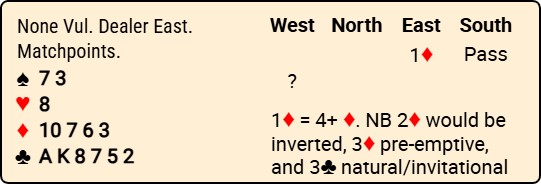
|
ACTION |
MARKS |
PANEL |
Competitors' |
|
3♣ |
10 |
7 |
27 |
|
3♦ |
9 |
7 |
21 |
|
2♦ |
8 |
7 |
22 |
|
1NT |
5 |
1 |
8 |
|
2♣ |
0 |
0 |
17 |
|
Pass |
0 |
0 |
2 |
|
3♥ |
0 |
0 |
1 |
|
4♦ |
0 |
0 |
1 |
|
5♦ |
0 |
0 |
1 |
Competition Entrant Average Score: 6.75
When my partner held this hand at the table, he bid 1NT and scooped most of the matchpoints. My observation afterwards was that I thought 1NT was bonkers, but I had to agree that he had scored better than I would have done. What I couldn’t tell him was what was better and, other than ‘anything’, the panel have also proved unable to do so. Thanks, panel – that makes it easy to mark!
I think the 3♣ bidders clearly have the best of the debate, followed by the 3♦ bidders, hence the marking. That will please the largest group of competition entrants, although the 17% who thought this hand was worth a game-forcing 2♣ are destined to be disappointed. We start with those who raise diamonds…
SALLY BROCK: 2♦. I don’t like it one bit!!
MATS NISLAND: 2♦. Inverted, but not game-forcing? I hope!
PAUL MARSTON: 2♦. This has got to be worth an invitation to game.
It has?
BARNET SHENKIN: 2♦.
ALAN MOULD: 2♦. Nothing is very attractive. I will overbid with 2♦. If you tell me 1NT is right, I am not listening.
Me neither, Alan, but I guess we play mostly IMPs, where this board would have been almost irrelevant😊
ANDREW ROBSON: 2♦. This is a bit of a stretch, but I’m too strong for 3♦ and I don’t want to suppress my fit. Hopefully, a 3♦ bid by either player at any point hereafter will be non-forcing.
Yes, indeed.
SIMON DE WIJS: 2♦. Not ideal, but the alternatives are worse IMO.
So, what do those who prefer a pre-emptive raise have to say?
CHRISTIAN MARI: 3♦. I hate inverted minors.
WENFEI WANG: 3♦. Fit is important.
MARTY BERGEN: 3♦. I definitely am not proud of this huge underbid, but I don't like the alternatives, and the key at matchpoints is avoiding minus scores.
Well, I’m afraid you didn’t manage that – but nor did almost anyone else.
MIGUEL VILLAS-BOAS: 3♦. 3♣ could be dangerous if my partner has a singleton or void in clubs. At least I know we have at least eight trumps in diamonds. I hope he bids again, and we can get to 3NT perhaps.
P.-O. SUNDELIN: 3♦.
HANS JOELE: 3♦. I am not thrilled with this choice, but I ended up here after eliminating the alternatives. A pre-emptive raise doesn't really reflect the potential playing strength of this hand, but other options distort the hand even worse. And it might prevent the opponents finding their heart fit.
ZIA MAHMOOD: 3♦. I’ll start with 3♦. Maybe I’ll get the chance to show my clubs later.
None of the diamond raisers seem particularly enamoured with their choice, so what have the club bidders to say for themselves?
JOEY SILVER: 3♣. Unfortunately, we are not playing fit showing jumps here, so I will content myself with bidding where I live.
JILL MEYERS: 3♣. Given the notes on our methods that accompanied the problem, I would show my good club suit, as neither 2♦ nor 3♦ really describe this hand.
Rob sums up the case for this option and, I think, wins the debate.
ROB BRADY: 3♣. This bid has three things going for it: 1) We may reach a light 3NT when partner has Qx in clubs; 2) It pre-empts the opponents if they have the majors; and 3) We get our lead director in if it's not our hand. Sometimes this passes out and we go minus instead of playing a making diamond partscore, but I like the upsides.

LIZ McGOWAN: 3♣. It is surprising that South has not overcalled. Surely North will, unless partner is 4-4-4-1 and very strong. I may as well tell partner where I live before the auction gets out of hand.
HANOI RONDON: 3♣. I have clubs, some fit for diamonds, and probably a better hand than an invitation, but I also want to take as much space from them as possible.
DAVID BIRD: 3♣. A tricky one. I would like to raise the diamonds, but it would have to be to 2♦ on these values. That would make life very easy for North. If the opponents go high in a major, I will at least have suggested a good lead.
LARRY COHEN: 3♣. Mixing what my hand is worth with pre-emption. The footnote rules out the possibility of finding partner with the dreaded 4-4-3-2 hand, but I still prefer 3♣ to 3♦ with this honour structure.
I think this faction easily wins the debate, and thus the top marks.
For the only panelist to score above average on the board, virtue will need to be its own reward.
PIERRE SCHMIDT & JOANNA ZOCHOWSKA: 1NT. For us, this is too much for 3♦, but not enough for 3♣. We're curious to see what's on the tray when it comes back.
It doesn’t!
At the table, 1NT worked like a dream opposite AQxx/KJx/Qxxx/Qx. The defence led a heart to jack and queen, and cleared the hearts. Six clubs and the ♠A later, declarer scored up +120 and an 80%+ board. Playing in either minor, there are three diamond losers, plus a heart and a spade (if the defence is quick).

We have a tie at the top of the panel this month, Larry Cohen and Andrew Robson sharing the honours with a very creditable 77/80. Completing the podium are Joey Silver, David Bird and last month’s winner, Christian Mari, all with 75/80.
With only half of the panel scoring in the 70s, special congratulations must go to this month’s guest, Hans Joele, who returned a more than respectable 73/80.
As always, many thanks to all members of our panel for taking the time to both educate and entertain our readers.
See you all next month. Marc
|
Larry COHEN |
4♠ |
4NT |
7♣ |
4NT |
2NT |
2♠ |
4♦ |
3♣ |
77 |
|
Andrew ROBSON |
4♠ |
4♠ |
7♣ |
4NT |
2NT |
2♠ |
4♦ |
2♦ |
77 |
|
David BIRD |
4♠ |
4NT |
6♠ |
4NT |
2NT |
2♠ |
4♠ |
3♣ |
75 |
|
Christian MARI |
4♠ |
4♠ |
Pass |
4NT |
2NT |
2♠ |
4♦ |
3♦ |
75 |
|
Joey SILVER |
2♥ |
4♠ |
6♠ |
5♣ |
2NT |
2♠ |
4♦ |
3♣ |
75 |
|
Zia MAHMOOD |
4♠ |
4NT |
6♠ |
5♦ |
2NT |
2♠ |
4♦ |
3♦ |
74 |
|
Hanoi RONDON |
2♥ |
4♠ |
6♠ |
4NT |
2NT |
3♥ |
4♦ |
3♣ |
74 |
|
Hans JOELE |
2♠ |
4♠ |
6♠ |
4NT |
2NT |
2♠ |
4♦ |
3♦ |
73 |
|
Rob BRADY |
4♠ |
4NT |
7♣ |
4NT |
2♠ |
2♠ |
4♠ |
3♣ |
71 |
|
Jill MEYERS |
2♥ |
4♠ |
Pass |
4NT |
2♠ |
2♠ |
4♦ |
3♣ |
71 |
|
Miguel VILLAS-BOAS |
4♠ |
4♠ |
6♠ |
4NT |
2NT |
4♣ |
4♠ |
3♦ |
71 |
|
Marty BERGEN |
4♠ |
6♣ |
7♥ |
4NT |
2NT |
2♠ |
4♠ |
3♦ |
67 |
|
Paul MARSTON |
4♠ |
4NT |
6♠ |
5♣ |
2♠ |
2♠ |
4♠ |
2♦ |
67 |
|
Pierre SCHMIDT & Joanna ZOCHOWSKA |
4♠ |
Dbl |
Pass |
4NT |
2NT |
2♠ |
4♠ |
1NT |
65 |
|
Barnet SHENKIN |
3♠ |
4♠ |
6♠ |
4NT |
2NT |
3♦ |
3NT |
2♦ |
64 |
|
Simon DE WIJS |
2♠ |
4♠ |
7♣ |
5♦ |
2NT |
2♠ |
5♦ |
2♦ |
63 |
|
Sally BROCK |
4♠ |
4NT |
6♠ |
5♦ |
2♠ |
3♦ |
6♦ |
2♦ |
62 |
|
Liz McGOWAN |
2♠ |
5♣ |
6♠ |
4NT |
2NT |
3♦ |
4♠ |
3♣ |
62 |
|
Mats NILSLAND |
2♥ |
4♠ |
6♠ |
5♦ |
2NT |
3♣ |
4NT |
2♦ |
62 |
|
P.-O. SUNDELIN |
4♠ |
6♣ |
7♠ |
5♦ |
2♠ |
4♣ |
4♦ |
3♦ |
61 |
|
Wenfei WANG |
2♠ |
4♠ |
Pass |
Pass |
2NT |
4♦ |
4NT |
3♦ |
55 |
|
Alan MOULD |
3♠ |
4NT |
7♥ |
Pass |
2♥ |
3♦ |
4♦ |
2♦ |
52 |
|
|
|
|
|
|
|
|
|
|
|
|
TOP SCORE |
4♠ |
4♠ |
6♠ |
4NT |
2NT |
2♠ |
4♦ |
3♣ |
|
|
HAND 1: |
4♠ 10 |
2♥ 8 |
3♠ 5 |
2♠ 4 |
|
|
|
HAND 2: |
4♠ 10 |
4NT 8 |
Dbl 7 |
6♣ 6 |
5♣ 4 |
|
|
HAND 3: |
6♠ 10 |
7♣ 9 |
7♠ 7 |
Pass/7NT 6 |
7♥ 5 |
6NT 3 |
|
HAND 4: |
4NT 10 |
5♣/5♦ 7 |
Pass 4 |
5♥ 2 |
|
|
|
HAND 5: |
2NT 10 |
2♠ 7 |
2♥/1NT 5 |
3NT 3 |
3♥ 2 |
|
|
HAND 6: |
2♠ 10 |
3♦ 7 |
3♥/4♦ 6 |
4♣/4♥ 5 |
5♣ 4 |
3♣/2♥ 3 |
|
HAND 7: |
4♦ 10 |
4♣/4♠ 7 |
4NT 6 |
5♦/6♦ 5 |
3NT 4 |
|
|
HAND 8: |
3♣ 10 |
3♦ 9 |
2♦ 8 |
1NT 5 |
|
|
|
HAND 1: |
4.74 |
|
HAND 2: |
4.35 |
|
HAND 3: |
8.30 |
|
HAND 4: |
6.11 |
|
HAND 5: |
6.06 |
|
HAND 6: |
5.85 |
|
HAND 7: |
6.30 |
|
HAND 8: |
6.75 |